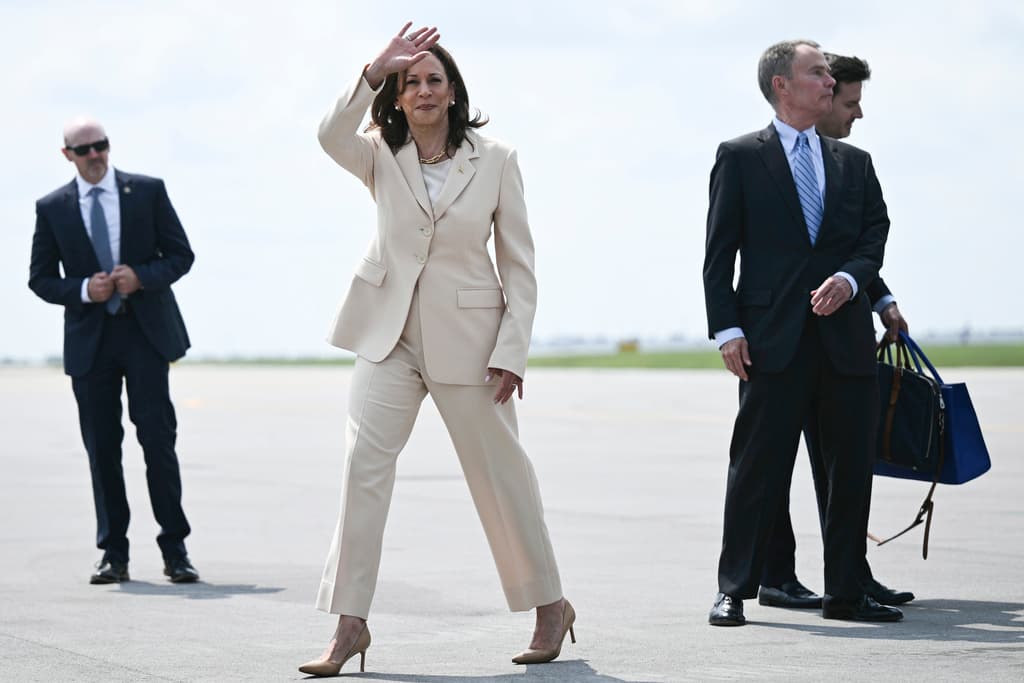Kamala Harris wears Converse shoes when she hurries to the airport gate. She wakes up at six every morning and gets on her exercise bike. She got married at 50 to lawyer Doug Emhoff, whom she met on a "blind date" arranged by friends. She has no children of her own, but two stepchildren who call her "Momala".
These are some of the personal details the 59-year-old has shared in interviews over the years.
But during her time as vice president, Kamala Harris has led a low-key life. She has been criticized for her lack of communication skills, her use of clichés, and for not presenting her own vision for the country.
She is one of the least popular vice presidents of all time. As the likely Democratic presidential candidate after Joe Biden's withdrawal from the race against Donald Trump, she must present herself seriously to her fellow citizens.
Bused as a child
If Kamala Harris wins the election in November, she will be the USA's first female president. It will be far from the first glass ceiling she has broken.
Harris was the first black woman to be elected district attorney in California's history, then the first woman to become the state's highest legal authority, followed by the first Indian-American senator, and in 2021 the first female vice president.
My mom used to say to me: "Kamala, you may be the first to do many things, but make sure you're not the last," Harris told CNN in 2019.
She grew up in Oakland near San Francisco in an academic immigrant family. Her mother came from India and became a prominent cancer researcher. Her father was born in Jamaica and became an economics professor at Stanford University.
As a little girl, she was "bused", i.e., placed in a school in a whiter, more affluent area as part of an integration program.
In college, Harris studied law. After graduating, she made a career as a progressive prosecutor with a focus on social justice. It was Harris who married the first same-sex couple in California. However, she also received criticism for people being imprisoned for minor offenses.
Flopped campaign
In 2016, she took a seat in the Senate. Two years later, she gained significant attention for pressing Brett Kavanaugh, the conservative judge nominated by Donald Trump to the Supreme Court, on his stance on abortion.
Can you think of any laws that give the state the right to make decisions about men's bodies, Harris asked, and got a negative response from Kavanaugh.
Advertisement
The next step was to enter the race for the Democratic presidential nomination in 2020. But then Harris failed to clarify what she stands for as a politician.
Her background as a tough prosecutor was not a winning concept in a time marked by Black Lives Matter demonstrations and criticism of racism within the justice system. The campaign became a flop.
Before it ended, she managed to attack Joe Biden in a heated debate moment for collaborating with senators who supported segregation and opposed "busing" in the 1970s. On live TV, Harris vividly told the story of a girl in California who was bused to school every day.
The little girl was me.
Advertisement
Can take on Trump's type
Joe Biden is said to have been hurt by the criticism, but still chose Harris as his vice presidential candidate. That she had a minority background – and was younger – was an advantage for reaching out broadly. Together, they defeated Trump in the 2020 election.
If Kamala Harris's prosecutor background was a liability in the race to become the presidential candidate in 2020, it is now considered an advantage. The USA is plagued by concerns about crime, and Republican Donald Trump is the first ex-president to be convicted of a crime.
As a prosecutor, I took on perpetrators of all kinds: Beasts who abused women, swindlers who deceived consumers, cheaters who broke the rules for their own gain, Harris said rhetorically recently.
Believe me when I say it: I can take on Donald Trump's type.
Advertisement
That Kamala Harris is now becoming the Democratic front figure is, however, not a foregone conclusion. Her opinion polls have gone downhill for most of the time she has worked with Joe Biden. Only four out of ten voters currently have a positive view of her, according to Real Clear Politics' compilation of polls.
Vice President Harris has been relatively invisible in the media and is said to have had problems finding her role in the White House. The task of investigating the root causes of migration from Mexico and other Central American countries did not make her more popular.
The Supreme Court's decision to repeal the general abortion law in 2022 became a turning point. Harris has become the Biden administration's leading spokesperson on abortion issues over the past year.
A "border czar"?
When President Biden announced that he would not run for re-election, Donald Trump's campaign quickly shifted focus to Harris. So far, they have mainly targeted the border issue and Kamala Harris's background.
She is a radical left-winger who will destroy the country if she ever gets the chance, Trump said recently at a campaign rally in Charlotte, North Carolina.
Neither border security nor migration policy has been Harris's area of responsibility as vice president, but in political advertising, the Trump campaign calls her a "border czar". Donald Trump claims that Harris has opened the borders and let a lot of "illegal immigrants" in.
In recent polls, Harris has narrowed the gap slightly compared to Trump, but the Republican still has an advantage. With fewer than 100 days left until the election, Kamala Harris faces her greatest challenge.
59-year-old Kamala Harris has been Joe Biden's vice president since January 2021. The two have a close working relationship, and Biden supports Harris as the Democratic Party's next presidential candidate.
Harris's father is from Jamaica, and her mother is from India, but she was born in Oakland, northern California. After living in Canada for a while and studying at Howard University in Washington DC, she returned to her home state to work as a lawyer and prosecutor. In 2004, she became the district attorney in San Francisco.
In 2011, she was appointed California's highest legal authority, a post she held until she was elected to the US Senate in 2016. Then she became the second black woman in the chamber.
Harris ran her own presidential campaign in 2019 before dropping out and backing Joe Biden.






